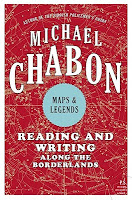 Recently I have been thinking of comic books -- or shall I say "graphic novels" the term that seems to describe large collections bound together.
Recently I have been thinking of comic books -- or shall I say "graphic novels" the term that seems to describe large collections bound together.I'm not really one who should be talking about such subjects because my comic book reading is and has been non-existent.
But it is for that reason that I feel like I can write this post in the first place.
It's interesting to me to think about how prevalent the influence of comic books are in current entertainment media -- it seems like many of the most buzzed about films started in the form of a comic.
Which, how appropriate is that since unlike traditional fiction which deal with words (and so can use flowery language and metaphor in his descriptions and characterizations as well as have a deeper emphasis on writing about emotion) the comic book immediately marries the image and the word in a way that should transition well to the big screen.
Yet, when I think about comic books I think about genre works usually of a superhero variety. I know this is not all the genre has to offer, but it's what I think.
I also think of single males in there teens and older with acne eating pizza and soda. Much of the picture that is presented in the character Oscar in Junot Diaz' Pulitzer Prize winning novel The Brief Wondrous Life of Oscar Wao.
 Yet, I look at comic books with a bias, thinking that they are only one thing. I suspect that my daughter will never pick up a comic or graphic novel with the intentions of being entertained, but it was interesting as I have recently been reading Michael Chabon's non-fiction work Maps and Legends: Reading and Writing Along the Borderlands because he discusses some of the history of comics.
Yet, I look at comic books with a bias, thinking that they are only one thing. I suspect that my daughter will never pick up a comic or graphic novel with the intentions of being entertained, but it was interesting as I have recently been reading Michael Chabon's non-fiction work Maps and Legends: Reading and Writing Along the Borderlands because he discusses some of the history of comics.As I discussed in a previous post in regards to the Uncle Scrooge comics, I often don't think about the history of comics and how not too many decades ago comic books had less standing as an art form, but perhaps a broader youth readership. You think about comics like Felix the Cat, Archie, Disney comics, and things of genre's we usually don't think of with comics (like westerns and romance).
Chabon in Maps and Legends makes a point that as comic books strived to legitimize themselves with sophisticated themes and the move from pulp comics to graphic novels wide-spread readership declined. Sure some graphic novels get review coverage in the NY Times book section, and some of these works have giant fan bases (example: Alan Moore & David Gibbons Watchmen).
Yet this genre has exploded in one general direction and it's interesting to think about how something can go from wide popularity, legitimize itself and have a smaller more devoted fanbase.

No comments:
Post a Comment